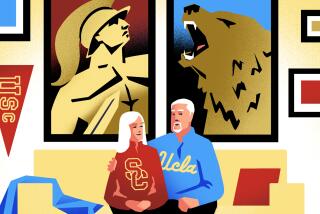With Paterno-Sandusky doc ‘Happy Valley,’ unsettling cultural questions
Around their Brooklyn home, the documentary filmmaker Amir Bar-Lev and his wife have developed a kind of code phrase -- a “thumbnail,” they call it -- for how people talk about the Jerry Sandusky affair. “Rhythmic slapping” is the term, and, picking up on a descriptor used by the key witness and former assistant coach Mike McQueary, it sums up people’s reflexive need to seek out the prurient aspects of the controversy.
And yet there is also, Bar-Lev has found, a desire for distance, an interest in lamenting or condemning aspects of the case so that people feel better about it, feel as if it’s something that happens far away from their own lives and consciousness.
“I think one of the things that really stands out about Sandusky is how everyone thinks that someone else was culpable,” Bar-Lev said in an interview here last week, returning home after weeks on the road with the film. “And really we’re all responsible in some way.”
Bar-Lev has become an expert in the notorious case and its fallout. His new movie, “Happy Valley,” which opened in theaters in Los Angeles last weekend, takes a look at the ways — some obvious, some subtle — our culture participated in the incident, and in fact continues to do so. As top-tier football institutions have been shaken by assault scandals and alleged cover-ups in the past few months — the Ray Rice and Adrian Peterson affairs, among others — “Happy Valley” speaks to a charged set of questions that were hardly put to rest when Sandusky was sent away on a long prison sentence in 2012.
Sandusky, of course, was the Penn State defensive coach who almost three years ago was found guilty on 45 charges of sexual abuse. The many-tentacled scandal that led to that courtroom moment — particularly the tentacle that involved legendary Penn State head football coach Joe Paterno, who it turned out had been made aware of Sandusky’s activities years before but did little to stop them — was a watershed event. It rocked the university’s State College campus, raised difficult questions about the culture of modern athletics and brought down Paterno, who saw his job and legacy vanish seemingly overnight, then died shortly after.
“Happy Valley” (the title is an ironic nod to the Penn State nickname) is not especially interested in issues of criminal guilt — those have long been established — but in the ways the town, the media and society at large responded to the incident. Through his months of filming on the Penn State campus, Bar-Lev discovers uncomfortable cultural truths in the various explanations and rationalizations.
Most notably, he unveils what he and a Penn State professor named Matt Jordan call a “shaming spectacle” — the idea that in public condemnations of Sandusky, people can feel better about the event and its outlier status without undergoing a more difficult process of self-scrutiny.
In both making the film and tracking the reactions since it premiered at the Sundance Film Festival in January, the director says he’s most noticed an innate discomfort with the subject. That is not, he said, simply because of the nature of child sex abuse, but because of how Sandusky went about his crimes. Instead of blunt force, Sandusky used a variety of seduction techniques, building trust with boys through the many perks of Division I Athletics and a nonprofit he founded for underprivileged youth.
“Sandusky was recruiting young men in the way that was not that different from how this country recruits young men to college football programs,” Bar-Lev said. “He may have been doing it for a different purpose, but he was borrowing from the playbook of Paterno and other football coaches regarded as heroes.”
Bar-Lev added: “In some ways I think had these been more literal rapes, where Sandusky physically held them down, we would be able to talk about it more.”
With football reigning supreme at Penn State, the Sandusky scandal raises the question of whether beloved programs at high-end schools operate above the law, its instructors shielded by the bubble of fandom and its administrators willing to look the other way when presented with evidence of wrongdoing. (Incidentally, these are also issues explored in this fall’s indie breakout, “Whiplash.”)
The Rice and Peterson cases raise similar questions. The running backs’ superstar status among their respective fan bases seemed to offer them wide berth to engage in the acts of domestic abuse they’ve been accused of. Questions about how much the Ravens and Vikings organizations — not to mention NFL commissioner Roger Goodell — knew about their activities have dogged the case and continue to draw criticism to the league.
But where many football fans are eager to see these scandals as the acts of lone deviants, Bar-Lev views them broadly — very broadly. Sandusky’s actions, he notes, were over the years enabled not just by a football program that was deemed above the law but by a larger economic system.
“I’m sure something like this could just as easily happen in more socialist cultures as well,” said Bar-Lev, who speaks in an articulate, at times academic, manner. “But there is a class component to the story. It’s not an accident that Sandusky went outside his world, to the other side of the tracks, to find many of his victims.” There was, Bar-Lev argues, a wide gulf between the redoubt of privilege that Sandusky occupied and the impoverished football-playing world many of his victims came from, and the director concludes that the exploitation of this gap was key to his crimes.
(Matt Sandusky, the coach’s adopted son, is a key figure in the film. Coming from a hardscrabble family, he was adopted by Sandusky and his wife and given a new life before he was, he says, abused by him. Matt Sandusky has begun to break his public silence by appearing with Bar-Lev at screenings and talking about the abuse he suffered; he describes in the film the cult of personality that lay at the heart of the scandal. “If people thought of Joe Paterno as God, Jerry was like Jesus,” he says. “They could do whatever they wanted, they could do no wrong.” Just being near Jerry Sandusky, the young man notes, gave him a sense of importance and power.)
As Bar-Lev has toured the country — he even took the film to State College recently, where he found a mostly receptive audience, and some scattered protesters — he has encountered many people, even those with no connection to Penn State, who’d rather avoid the subject. He said he believes the reaction is telling of the scandal itself.
“There’s something about the failings of everyone in this case that come close to a lot of our own failings,” he said. “We say that Joe Paterno put blinders on, but we all put blinders on to inequities all around us. I think that’s what makes this so fundamentally difficult to deal with.”
The director has developed a specialty in what might be called hero revisionism — he previously directed “The Tillman Story,” which took another look at the popular legend around the late soldier and football player Pat Tillman, and is currently working on a documentary about the Grateful Dead that reevaluates the mythos of Jerry Garcia and the relationship between the band and its followers. (Bar-Lev, interestingly, is not a big sports fan but is a hard-core music devotee.)
It is in these areas of fan worship that he says we find something uniquely American, even human. Among the many other implications of Sandusky, after all, is a pulling back of the hero veil.
“I think the underlying questions of the movie is ‘Can we still go on? Is it OK to cheer now that we know all that we know?’” Bar-Lev offers no easy answers. But all of us who have ever admired and rooted for a public figure will now find ourselves asking questions.
Twitter: @ZeitchikLAT
More to Read
Only good movies
Get the Indie Focus newsletter, Mark Olsen's weekly guide to the world of cinema.
You may occasionally receive promotional content from the Los Angeles Times.







